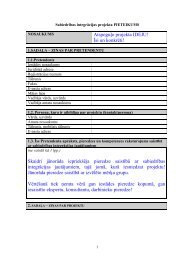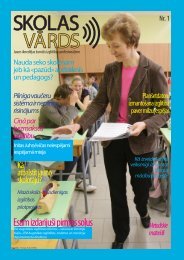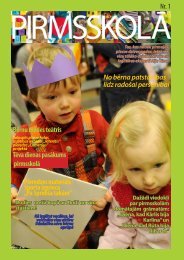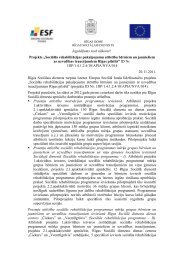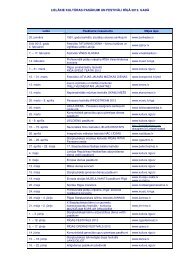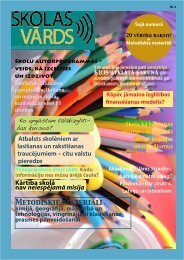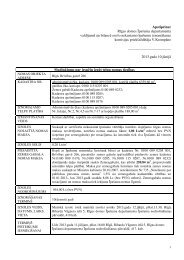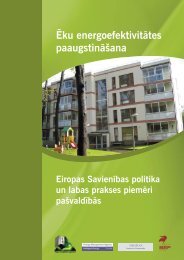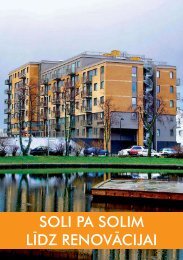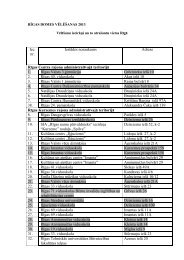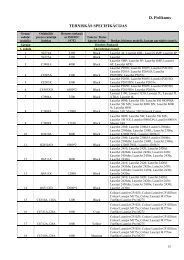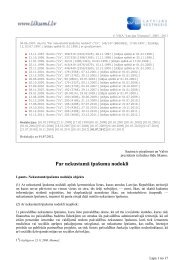Riga - European Capital of Culture 2014 candidate
Riga - European Capital of Culture 2014 candidate
Riga - European Capital of Culture 2014 candidate
- No tags were found...
You also want an ePaper? Increase the reach of your titles
YUMPU automatically turns print PDFs into web optimized ePapers that Google loves.
July–September• Song Celebration <strong>of</strong> Children and Young Adults – addressingaudiences <strong>of</strong> young adults and children, the popularisation <strong>of</strong> theKult[rix] brand in the specified audiences.October–December• Activation <strong>of</strong> the basic values <strong>of</strong> Kult[rix] and the basic elements<strong>of</strong> the <strong>2014</strong> concept via projects in the preparatory periodand their communication campaigns.2011• Activation <strong>of</strong> the basic values <strong>of</strong> Kult[rix] and the basic elements<strong>of</strong> the <strong>2014</strong> concept via projects in the preparatory periodand their communication campaigns.• International activities in the promotion <strong>of</strong> the <strong>Riga</strong> ideas(conferences, cooperation partner networks, activities via Latvianembassies, cooperation with Latvians living abroad).2012• Continuation <strong>of</strong> activities, started in 2011• Initiation <strong>of</strong> individual ECC<strong>2014</strong> projects, promotion <strong>of</strong> theKult[rix] brand through these, including the <strong>European</strong> Biennale forContemporary Art Manifesta (tbc).• International activities in promoting <strong>Riga</strong> as ECC (conferences,cooperation partner networks, activities via the Latvian embassies,cooperation with Latvians living abroad).2013• Publicity campaign for the Force Majeure programme conceptand principal themes in Latvia and abroad.• Initiation <strong>of</strong> indivdual ECC<strong>2014</strong> projects, promotion <strong>of</strong> theKult[rix] brand through these, including Song and Dance Celebration,Tall Ships Races (tbc).• Marketing activities.• Social advertisements.• PR about upcoming activities for the <strong>European</strong> <strong>Capital</strong> <strong>of</strong> <strong>Culture</strong>.• Communication <strong>of</strong> the Kult[rix] and Force Majeure brand andslogan within the framework <strong>of</strong> the Latvian Song and Dance Celebration,reaching a wide audience <strong>of</strong> Latvian inhabitants and foreignvisitors.<strong>2014</strong> Stage 3:Comprehensive communication campaign about ECC events.A detailed plan to be developed based on the plan <strong>of</strong> actualevents.2015• Repeated survey about cultural understanding in Latvian society,changes after <strong>2014</strong>, benefits from the organisation <strong>of</strong> ayear-long programme, measuring the communication objectivesachieved.• Creation <strong>of</strong> links with the next ECC cities, experience handover,“Amber Route” projects.Proposed resources for the implementation <strong>of</strong> information andpublicity events Included in the financial appendix <strong>of</strong> the book.Management and surveillance<strong>of</strong> the communication processThe communication process, including media relations, areplanned and coordinated by the ECC Office:• plan media activities.• coordinate PR activities <strong>of</strong> the involved partner institutionsand ensure that the partner institutions inform the ManagementGroup about their plans in time, ensuring internal communicationby regular newsletters, direct contacts and regular planning meetings;• determine guidelines for the use <strong>of</strong> the logo and slogan, andcontrol implementation.Potential threats and crisis communicationThe Project Management Group must be prepared for several potentialsources <strong>of</strong> risk:1. The potential change <strong>of</strong> political power on local and nationallevel, and a potentially poor interest in the cultural project or overtlydominant political intervention attempts regarding project implementation:• <strong>Riga</strong> City Council will change twice during the project period(local government elections in June 2009 and June 2013);• National parliamentary elections – Autumn 2010, Autumn <strong>2014</strong>.To ensure stability in case <strong>of</strong> crisis, it is intended to develop andmaintain close contact with the Chancery <strong>of</strong> the President <strong>of</strong>Latvia. Although, there is the potential for the President <strong>of</strong> Latviato change during the project period (elections for the President<strong>of</strong> Latvia are anticipated in the Latvian parliament in mid-2011),according to the Constitution <strong>of</strong> Latvia, the President does notrepresent any political power. Taking into account the authority <strong>of</strong>the presidency in Latvian society, this institution may be a powerfulopinion leader in matters affecting the significance <strong>of</strong> the ECCstatus for the country and society, as well as for the internationalimage <strong>of</strong> the country.Latvia’s representation in <strong>European</strong> Union institutions is anotherpolitical communication tool that it is planned to use. The<strong>European</strong> Parliament (EP) elections, due to take place in mid-2013, provide the opportunity for Latvian EP deputy <strong>candidate</strong>s(after the elections – the deputies) to position matters concerningthis project, which is significant for <strong>Riga</strong>, Latvia and Europe, onthe agenda. An equally influential tool in the creation <strong>of</strong> the Latvianpolitical agenda relating to the successful planning and implementation<strong>of</strong> the ECC<strong>2014</strong> project, is active dialogue with <strong>European</strong>Commission representatives and with events created togetherwith the <strong>European</strong> Commission Representation for leading politicaland social opinion-makers about the significance <strong>of</strong> ECC.2. Risk <strong>of</strong> financial difficulties for the project.In light <strong>of</strong> the global economic crisis <strong>of</strong> 2009, and financial burdenfaced by Latvia, the government is aiming towards a 20–40% reduction in the budget, and this will also affect the city’sfinancial planning and budgetary expenses in various sectors.In order that the Project Management Group may react with flexibilityto changes in the project budget dictated by external conditionsand to maintain the national significance and prestige <strong>of</strong>ECC, analysis <strong>of</strong> the experiences <strong>of</strong> Vilnius ECC 2009, Lincas ECC2009 and the planned ECC cities for 2010 is proposed in Stage 2,i.e. 2010–2013, and based on this, establish communication withthe project partners in <strong>Riga</strong> and Latvia to create an action plan forcrisis situations. Cultural operators and NGO’s will have significantroles in the development <strong>of</strong> the action plan, and their involvementin decision making may help to reduce the potential tension duringthe project implementation. The Latvian public will be informedabout the action plan developed by the city, using the project sitewww.Kult[rix].lv and mass media, as well as the <strong>European</strong> Commission,the ECC city network, <strong>Riga</strong>’s partnership towns and othercooperation networks in Latvia and abroad. The support <strong>of</strong> the<strong>European</strong> Commission in developing the project, which enforcesthe prestige <strong>of</strong> the project in society, should be highlighted.3. Tension created by operators not involved in the project, aswell as project opponents.During the implementation <strong>of</strong> such projects, there is a strong risk<strong>of</strong> opposition. The main arguments are usually connected to theuse <strong>of</strong> tax payers’ money; for example, in economically difficulttimes, <strong>Riga</strong> is spending money on ‘entertainment, not bread’, orother topics relevant to society at the respective period <strong>of</strong> time.To reduce such potential tension, it is important to maintain regularcommunication with leading opinion-makers, ensure that theProject Management Group maintains a transparent decisionmakingprocess, its activities are explained to the general publicand it works towards the creation <strong>of</strong> a unified image <strong>of</strong> the project,emphasising the significance <strong>of</strong> culture for various economic sectorsand the economy overall. A database <strong>of</strong> cultural operators andpotential cooperation partners for the project has already been developed;discussions with representatives from the most influentialmass media are underway regarding the project aims, and a widecircle <strong>of</strong> cultural operators, NGO’s and leading opinion-makers areinvolved in project preparation. Similarly, pr<strong>of</strong>essionals with experiencein managing large-scale projects <strong>of</strong> national significance,and institutions, with a positive public image, are involved in theproject. Pro-active discussions in the public space and with themain target audiences about potentially sensitive issues will avoidthe escalation, or even occurance, <strong>of</strong> tension.170 171



